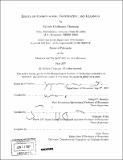Essays on coordination, cooperation, and learning
Author(s)
Chassang, Sylvain Guillaume
DownloadFull printable version (8.433Mb)
Other Contributors
Massachusetts Institute of Technology. Dept. of Economics.
Advisor
Abhijit V. Banerjee and Muhamet Yildiz.
Terms of use
Metadata
Show full item recordAbstract
This thesis is a collection of essays on coordination and learning in dynamic cooperation games. Chapter One begins by establishing results which are required in order to extend the global games approach to settings where the game structure is endogenous. In particular it shows that the selection argument of Carlsson and van Damme (1993) holds uniformly over appropriately controlled families of games. It also discusses selection results when the game lacks dominance regions. Chapter Two uses these results to investigate the impact of miscoordination fear in a class of dynamic cooperation games with exit. More specifically, it explores the effect of small amounts of private information on a class of dynamic cooperation games with exit. It is shown that lack of common knowledge creates a fear of miscoordination which pushes players away from the full-information Pareto frontier. Unlike in one-shot two-by-two games, the global games information structure does not yield equilibrium uniqueness, however, by making it harder to coordinate, it does reduce the range of equilibria and gives bite to the notion of local dominance solvability. (cont.) Finally, Chapter Two provides a simple criterion for the robustness of cooperation to miscoordination fear, and shows it can yield predictions that are qualitatively different from those obtained by focusing on Pareto efficient equilibria under full information. Finally Chapter Three studies how economic agents learn to cooperate when the details of what cooperation means are ambiguous. It considers a dynamic game in which one player's cost for the cooperative action is private information. From the perspective of the other player, this cost is an unknown but stationary function of observable states of the world. Initially, because of information asymmetries, full cooperation can be sustained only at the cost of inefficient punishment. As players gain common experience, however, the uninformed player may learn how to predict her partner's cost, thereby resolving informational asymmetries. Once learning has occurred, players can sustain cooperation more efficiently and reduce the partnership's sensitivity to adverse economic conditions. Nevertheless, because inducing information revelation has an efficiency cost, it may sometimes be optimal for the uninformed player to remain uninformed even though that limits the amount of cooperation that can be sustained in equilibrium.
Description
Thesis (Ph. D.)--Massachusetts Institute of Technology, Dept. of Economics, 2007. "June 2007." Includes bibliographical references.
Date issued
2007Department
Massachusetts Institute of Technology. Department of EconomicsPublisher
Massachusetts Institute of Technology
Keywords
Economics.